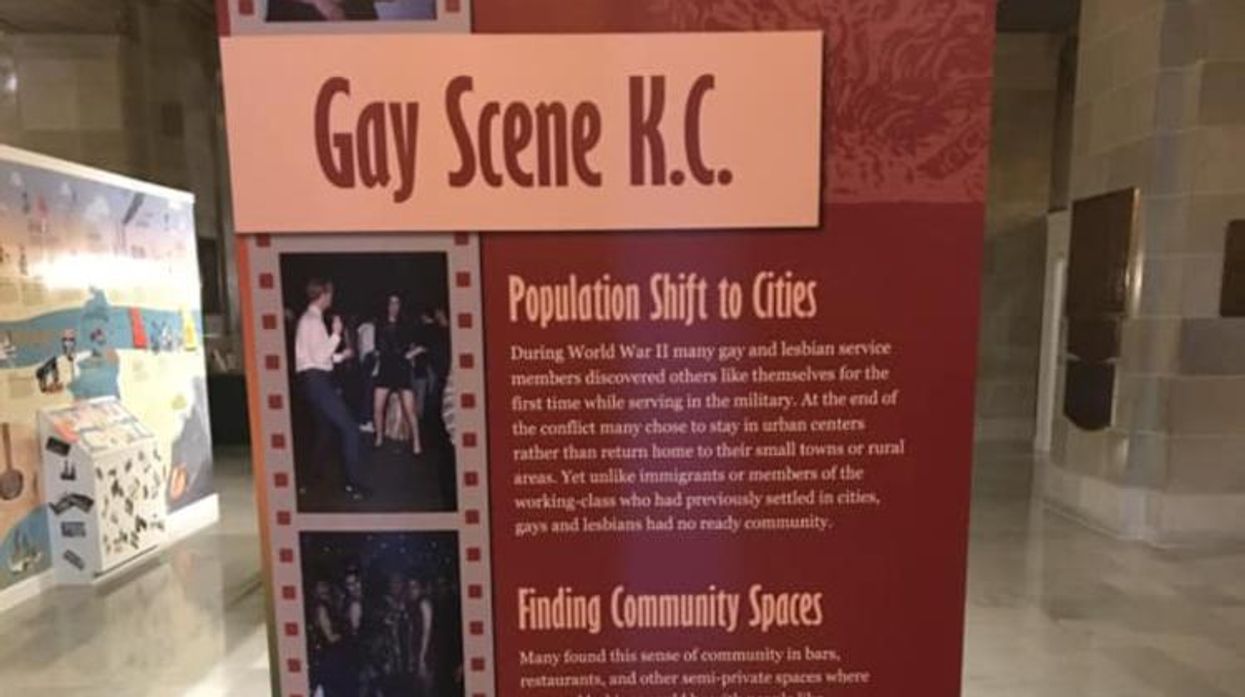Voices
The LGBTQ+ History Exhibit That (Unfortunately) Made History

via Facebook
A scandal in Missouri shows the past is very much present when it comes to erasing the queer experience.
September 15 2021 4:00 PM EST
By continuing to use our site, you agree to our Privacy Policy and Terms of Use.

A scandal in Missouri shows the past is very much present when it comes to erasing the queer experience.
Something happened recently in Missouri that dredged up a particular anxiety and anger that I hadn't felt in a long time. A few vocal critics imposed their religious beliefs and cult of family values on the Missouri State Museum, forcing it to take down a display about the LGBTQ civil rights movement in Kansas City. As the antigay history provocateur who started the protests put it:
"Update on pro LGBT 'history' exhibit. Thanks to the efforts of several of our great elected officials, the exhibit has been removed from the Missouri State Museum! To God be the glory! Shoutout to Rep. Ann Kelley and Rep. Brian Seitz for taking the bull by the horns! I also spoke with multiple other elected officials who were ready and willing to take action, thank you all for standing for traditional family values!"
The moment I heard the news and read these celebratory words, all the controversies and struggles of a previous era returned to mind.
When I was a new high school history teacher in the early 1990s, my 800-page American history textbook did not make even one reference to the LGBTQ community. No mention of the Lavender Scare. Nothing about Stonewall. Not a word about the 1979 or 1987 marches on Washington. Bayard Rustin didn't mentor Martin Luther King in non-violence. And Elaine Noble and Harvey Milk did not exist in the world my textbook created.
These absences were among the reasons in January 1994 that I proposed naming that October the first (then called) Lesbian and Gay History Month. I knew that finding oneself in the story is vital for increasing student interest and for their personal development. My students, LGBTQ and not, had a right to know that LGBTQ people were part of history's mix - in all times, places, and circumstances. As a non-tenured teacher, of course, I knew that promoting LGBTQ history came with a risk of being disciplined (I was) and even being fired (I almost was), but these were risks I was willing to take.
Today, of course, things are better than they were in 1994. We've seen monumental legislative actions and Supreme Court decisions that have carved in stone the rights to honestly serve in the armed forces, to marry the person of one's choice, and to keep a job on one's merit. We have also witnessed the creation of hundreds of local, state, and regional LGBTQ history organizations. So much progress - which is why what happened in Missouri proved shocking.
What does it means in 2021 to have one's history canceled? How could a "book burning" happen in the Missouri capitol, where the Missouri State Museum is housed? How is it even possible that the history of LGBTQ people can, quite literally, be removed from the premises of the seat of legislative government in Missouri? What will be the long-term repercussions? Is this the beginning of a new wave of anti-LGBT history activism? All of these questions!
Additionally, I wondered what young LGBTQ Missourians felt when they learned that their state government opted to remove a display about their group's history. How might this hurt them? Don't they have enough to deal with already? Fortunately, young LGBTQ people are bolder and braver than my generation was and they will not stop advocating for the histories of all peoples. Still, for a young person not yet fully independent of mind and self-integrated in regard to gender or sexuality, this blow could be devastating. We have to stand with them.
Let's do that this October by marking the 28th annual LGBTQ+ History Month. Set aside to remember the lives and loves of the LGBTQ community, History Month is a special time to make an extra effort to learn about LGBTQ individuals in history and to study how in extraordinarily difficult circumstances they created kinship and community and inched forward everyone's self-evident right to enjoy the blessings of liberty. History Month, simply put, is about empowerment in the face of adversity - then and now.
I hope that what happened in my state last week will serve to encourage participation in workshops, book clubs, lectures, and displays about LGBTQ history; and that as a result of this dreadful news from Missouri more schools, libraries, and activist groups will observe this October by highlighting the history that some would ban. I hope, too, that we have been reminded that there are still people who want to take us back to a recent time when an 800-page textbook on the American story didn't include a single reference to LGBTQ history.
Rodney Wilson founded LGBTQ+ History Month in 1994. In 2020, he was named a Missouri Trailblazer by the Missouri State Museum. His story is told in the documentary-short Taboo Teaching: A Profile of Missouri Teacher Rodney Wilson. Follow him on Twitter @rodneycwilson.
Charlie Kirk DID say stoning gay people was the 'perfect law' — and these other heinous quotes